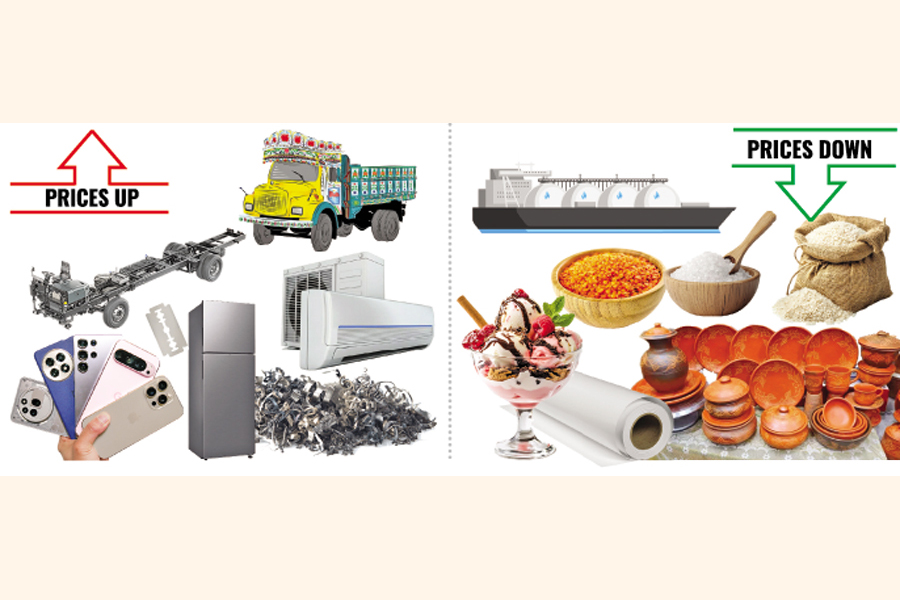
Published :
Updated :

A number of items may see hike in prices from July 1, 2025 following a tax rise proposed in the budget placed by the Finance Adviser on Monday.
However, prices of essential commodities including rice, pulses, ginger, garlic may go down with a downward revision of source tax at the supply stage.
With the withdrawal of VAT on local manufacturers of refrigerators and air conditioners, consumers may have to pay higher taxes on purchase of those electrical and electronics items.
Mobile phones assembled and manufactured locally are likely to become more expensive due to an increase in the reduced VAT rate, which has gone up by 2.0 per cent to 2.5 per cent, depending on the production category.
The price of shaving blades used in salons may also rise, as VAT on stainless steel and carbon steel strip blades has been increased from 5.0 per cent to 7.0 per cent. Buses and trucks, assembled locally using imported chassis, will become costlier due to a newly imposed 5.0 per cent VAT on body manufacturing.
Plastic-made tableware, kitchenware, household items, hygienic and toilet goods are also set to become more expensive, as VAT on their production has been raised from 7.5 per cent to 15 per cent. Locally produced yarn will see a price increase as specific tax on cotton and man-made fibre yarns has been raised from Tk 3.0 to Tk 5.0 per kg, which could drive up prices for products like gamchas, lungis, and other garments.
The price of construction materials is also expected to rise. Specific duties on scrap metal, the primary raw material for rods and angle bars, have gone up from Tk 1,000 to Tk 1,200. Duties on billets, ingots, and chemicals like ferro manganese and ferro silica manganese used in the melting process have also been increased. Helicopters may become more expensive due to a proposed 10 per cent import duty.
Cosmetic products-such as lipstick, lip liner, eyeliner, facewash, and other makeup items-will likely become more costly, as the minimum import value for these items has been increased. For example, the customs valuation of imported lipstick has been proposed to rise from USD $20 to USD $40 per kg. Similarly, the minimum value for other cosmetics has also been revised upward.
Imported chocolates may see a price hike as their minimum customs value has increased from USD $4.0 to USD $10, affecting all types of imported chocolate. Foreign toys will likely become costlier due to a hike in their tariff value, aimed at protecting the local toy industry. Marble and granite, used for flooring in homes, will also become more expensive, with the import duty rising from 20 per cent to 45 per cent.
Among the products also likely to see price increases are clinker (used in cement production), steel, baby foods, parts of LED lights, lifts, computer monitors up to 22 inches, OTT (Over-the-Top) services, and cigarettes. Additionally, the cost of goods purchased online, mobile telephone sets, and overall construction of building structures may rise, along with increased transportation costs for buses and trucks.
On the other hand, some products may become cheaper. For instance, ice cream, a favourite treat for all ages, could see a price drop as the supplementary duty at the supply stage is proposed to be cut from 10 per cent to 5.0 per cent. Buses with 16 to 40 seats and microbuses may also see price reduction. The import duty on these vehicles is set to be lowered from 10 per cent to 5.0 per cent and from 20 per cent to 10 per cent, as part of a strategy to reduce traffic congestion.
Iodised salt might become more affordable as the import duty on potassium iodate-an ingredient in its production-has been withdrawn. Refined sugar is also expected to cost less, with specific duty reduced from Tk 4,500 to Tk 4,000 per tonne.
Sandpaper and writing paper may become cheaper due to reduced import duties on their raw materials, including phenolic resin and coating materials. Cricket bats are also likely to see a price drop as import duty on wood used in bat production has been reduced from 37 per cent to 26 per cent, encouraging local manufacturing.
Additional products that may see price reductions include imported butter, earthenware plates, biodegradable glasses, plates, bowls, Japanese seafood scallops (with duty slashed from 25 per cent to 5.0 per cent), hoses, certain types of beverages, liquefied natural gas (LNG), fuels, limestone, and several essential commodities such as rice, wheat, pulses, black pepper, cinnamon, nuts, clove, dates, and cassia leaves.
Price reductions may also apply to computers and computer parts, fruit bags, cancer medicines, napkins and diapers, power purchase bills, handicrafts and utensils made from leaves, bark, or clay, textile-grade PET chips, sanitary napkins, packaged liquid milk, ballpoint pens, imported materials and spare parts for hospital beds, LPG cylinders, four-stroke three-wheelers, and lithium and graphene batteries.
doulotakter11@gmail.com
newsmanjasi@gmail.com
sajibur@gmail.com


 For all latest news, follow The Financial Express Google News channel.
For all latest news, follow The Financial Express Google News channel.